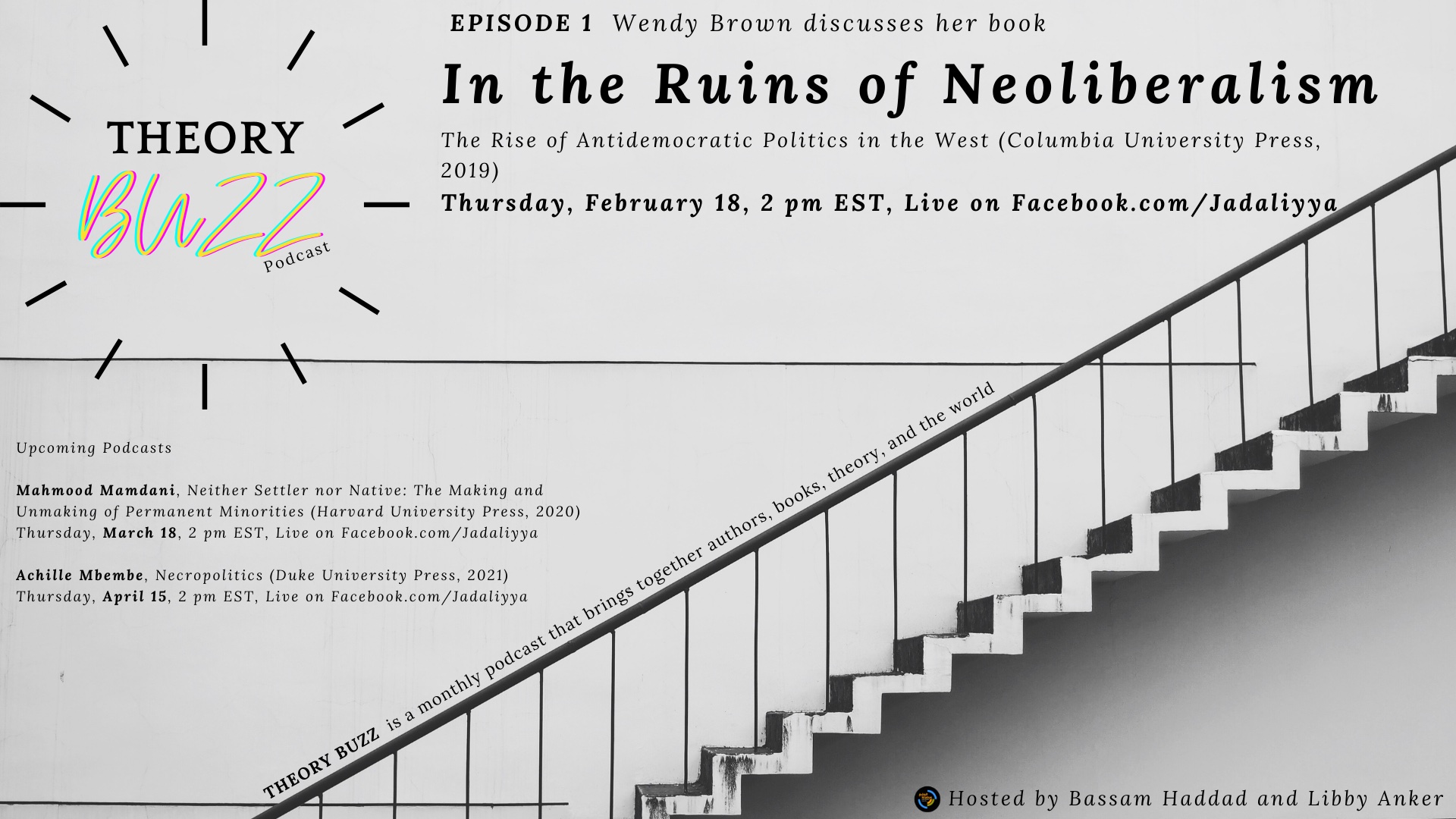Theory Buzz Podcast
Book Discussion with Wendy Brown
In the Ruins of Neoliberalism
The Rise of Antidemocratic Politics in the West(Columbia University Press, 2019)
Thursday, 18 February 2020
2 PM EST
Hosted by Bassam Haddad and Libby Anker
Join us for our first episode of Theory Buzz Podcast (TBP), a monthly podcast that brings authors, books, theory, and the world together in a dynamic way. Away from both lofty pretenses and empiricist disdain, we cut through the jargon to elucidate important ideas and emphasize their significance to our moment. Every month, we hold a friendly but productive conversation with an author of a recent book in social theory, broadly conceived (don’t hold us to account on “recent”). Our conversations will address the history and trajectories of these works, while emphasizing their relevance to, and impact on, the worlds we live in. Visit www.TheoryBuzz.com for more information.
Wendy Brown is a renowned political theorist and The Class of 1936 First Chair in Political Science at UC Berkeley. Her work on power, political identity, and neoliberalism has influenced a generation of scholarship on contemporary democratic politics. Her most recent books include Undoing the Demos: Neoliberalism's Stealth Revolution (Zone 2014) and In the Ruins of Neoliberalism: The Rise of Antidemocratic Politics in the West (Columbia, 2019). Her books have won many prizes and have been translated into 20 languages.
Hosts
Elisabeth Anker is an Associate Professor of American Studies and Political Science at George Washington University. She is the author of Orgies of Feeling: Melodrama and the Politics of Freedom (Duke, 2014) and the forthcoming book Ugly Freedoms (Duke, 2022 expected). She is also co-editor of the journal Theory & Event, and a frequent contributor on international television and radio news. @libankerDC
Bassam Haddad is Director of the Middle East and Islamic Studies Program and Associate Professor at the Schar School of Policy and Government at George Mason University. He is the author of Business Networks in Syria: The Political Economy of Authoritarian Resilience (Stanford University Press, 2011) and co-editor of A Critical Political Economy of the Middle East (Stanford University Press, 2021). Bassam is Co-Founder/Editor of Jadaliyya Ezine and Executive Director of the Arab Studies Institute. He serves as Founding Editor of the Arab Studies Journal and the Knowledge Production Project. Bassam is co-producer/director of the award-winning documentary film, About Baghdad, and is Director of the Middle East Studies Pedagogy Initiative (MESPI). He received MESA's Jere L. Bacharach Service Award in 2017 for his service to the profession. @4bassam
[To contact the hosts of Theory Buzz, email hosts@theorybuzz.com.Visit www.TheoryBuzz.com for more information.]
Upcoming Podcast Episodes
Mahmood Mamdani, Neither Settler nor Native: The Making and Unmaking of Permanent Minorities (Harvard University Press, 2020)
Thursday, 18 February, 2 pm EST, Live on Jadaliyya's Facebook
Achille Mbembe, Necropolitics (Duke University Press, 2021)
Thursday, 15 April, 2 pm EST, Live on Jadaliyya's Facebook

